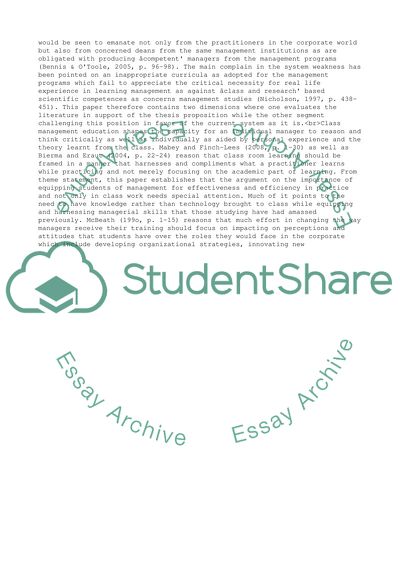Cite this document
(“Using the classroom to help develop people already practising Essay”, n.d.)
Using the classroom to help develop people already practising Essay. Retrieved from https://studentshare.org/management/1641507-using-the-classroom-to-help-develop-people-already-practising-management-is-a-fine-idea-but-pretending-to-create-managers-out-of-people-who-have-never-managed-is-a-sham-critically-debate-this-proposition-drawing-on-the-literature-on-management
Using the classroom to help develop people already practising Essay. Retrieved from https://studentshare.org/management/1641507-using-the-classroom-to-help-develop-people-already-practising-management-is-a-fine-idea-but-pretending-to-create-managers-out-of-people-who-have-never-managed-is-a-sham-critically-debate-this-proposition-drawing-on-the-literature-on-management
(Using the Classroom to Help Develop People Already Practising Essay)
Using the Classroom to Help Develop People Already Practising Essay. https://studentshare.org/management/1641507-using-the-classroom-to-help-develop-people-already-practising-management-is-a-fine-idea-but-pretending-to-create-managers-out-of-people-who-have-never-managed-is-a-sham-critically-debate-this-proposition-drawing-on-the-literature-on-management.
Using the Classroom to Help Develop People Already Practising Essay. https://studentshare.org/management/1641507-using-the-classroom-to-help-develop-people-already-practising-management-is-a-fine-idea-but-pretending-to-create-managers-out-of-people-who-have-never-managed-is-a-sham-critically-debate-this-proposition-drawing-on-the-literature-on-management.
“Using the Classroom to Help Develop People Already Practising Essay”, n.d. https://studentshare.org/management/1641507-using-the-classroom-to-help-develop-people-already-practising-management-is-a-fine-idea-but-pretending-to-create-managers-out-of-people-who-have-never-managed-is-a-sham-critically-debate-this-proposition-drawing-on-the-literature-on-management.


